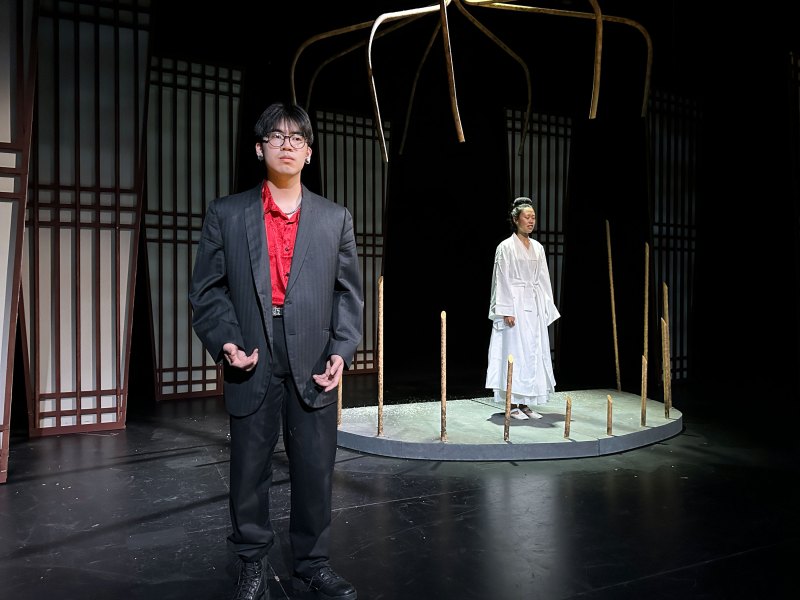A girl of age seven in a white dress lays behind a sheer veil on the stage of Pigott Theater, breathing shallowly. Her father offers her to a woman in red as repayment for his debt. The woman faces the audience and asks, “Is it more profitable to raise a water buffalo or a child?”
Theater & Performance Studies’ (TAPS) production of “Snow in Midsummer” was a reimagination of the classic 13th-century Chinese play “Injustice to Dou E.” Director Mai Lan Nguyen ’22 M.S. ’23 fell in love with the original play and adapted it into a fusion of modern and traditional familial concepts. Complete with humor, heartache and TikTok dances, the performance led the audience to ponder the themes of justice, love and family.
The storyline was a rollercoaster covering many of the issues we face today. Specifically, it is about two young people who have different ideas about marriage. After the girl (“Daughter,” played by Tiger Zhou ’23) is abandoned by her father, she grows up to marry the son of the woman in red (“Mother,” played by Ishrita Pol ’26), but is then widowed. Three years later, she is wooed by Young (Bea Phi ’24), who proposes under pressure from his father (“Father,” played by Brian Xu).
Daughter tries to resist the marriage, but Young’s proposal is all the more persistent. This leads to a turn of events, which conclude with Young poisoning his own father and pressing charges against Daughter for murder. On the midsummer day, after she is beheaded, layers of snow cover her body, indicating the Heavens’ indignation at her tragedy.
Each character is faced with a predicament: they have to decide whether to fulfill their family duties or their own wishes.
This issue was presented from the beginning. EDM music plays as lights flash green, mimicking a nightclub. Young dances in a red shirt and Rolex and tells the story of his life. His father suddenly enters the scene, telling him to get married and carry on the family name. The son refuses, and his father slaps him.
At that moment, the music dims and lights fade, amplifying the sudden silence between the two characters. These artistic choices powerfully underscored tensions in the father-son relationship, setting up for the murder at the end of the play.
Daughter is similarly torn between her loyalty to her husband’s family and Young’s tempting marriage proposal. The two’s first interactions, with Daughter questioning Young’s motives and Young making up answers, were the most entertaining moments of the production. Phi’s acting portrayed Young as a clumsy persona, which gave humor to the scene. His bland responses, which elicited an uproar of laughter from the audience, included “You’re pretty” and “My favorite color is also white.”
This scene delivered. It vividly portrayed the two young adults trying to figure out their futures amid the pressures of marriage and loyalty. Daughter is more traditional, struggling to let go of her past marriage and accept modern values. The scene simultaneously depicts Young, who dances in nightclubs and obsesses over Rolex, struggling with traditional values such as the obligation of marriage.
The play was filled with many complexities. While some moments were powerful, others were confusing. For instance, the narrative at times fast-forwards to the future, where Mother talks to Daughter’s ghost, yet other scenes show Daughter being alive and well. The transition was not done in a manner that flowed with the rest of the play.
Additionally, the interactions between Young, Judge (Nhu Pham ’25) and Doctor (Phong Nguyen ’25) — who gives Young the poison — are elusive and cheesy at times. It was unclear why Judge helps Young get away with murdering his father; after all, she holds the power of the law in her hands. The banter between Doctor and Judge was filled with fun popular culture references that sometimes seemed cliche and irrelevant.
In the end, “Snow in Midsummer” was an impressive adaptation, embodying characters who are dynamic and complex. The actors added personalities to the roles. As Nguyen said, the show was challenging because actors “have to go through many different ends of the emotional spectrum.”
Editor’s Note: This article is a review and includes subjective thoughts, opinions and critiques.
